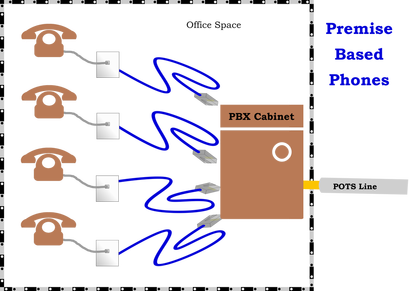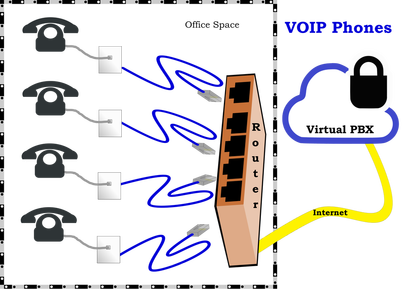|
I am a business owner of a telecommunications company and one of my struggles is an adequate understanding of our products and services. I don’t possess a technical background to be able perform most of the services we offer. I like most other office people use desk phones daily, not giving much consideration to what makes them work. When talking with others about our business, I lack a simple understanding to effectively communicate what we do. However, in a recent conversation, the light bulb came on! I finally understand a fundamental difference between the older technology versus the newer technology. In other words, I have the ability to explain a fundamental difference of the premise-based phone and the hosted phone. The following explanation and illustrations were created to compare Plain Old Telephone Service (POTS) and Voice Over Internet Protocol (VOIP). The purpose is to enlighten others about changes in telephony and help them make informed choices. Businesses who take advantage of the new technology find that it can be a cost effective way to enhance productivity. If you remember the time before cell phones, you know that all calls were placed through a phone that was plugged into a special outlet. Many office desk phones still function in the same way. Even cordless phones have a base that needs to make that same connection. If you are like me, you have never thought about the actions behind the plug that causes the phone to work. The typical office phone system is managed through a private branch exchange (PBX). The PBX creates a phone network within the organization. The network consists of cables running from each outlet into a specified area. The designated location is where the office phones are linked with the outside power source (POTS lines or Internet) in one of two ways. Lines are connected into a phone cabinet (computer) of the system that is located in the building or into a router that shifts the control to the cloud.  Premise-based PBXs have the computing power in a cabinet located physically within the walls of the business. This allows the business to choose a company who can service and maintain their phone system. Interconnect companies like Trident Communications provide programming services for the office phone system. Technicians are given permission to enter the office, go to the room, and make changes to the system’s functionality as required. In general, everything about the phone system is confined to the office space. The outside service provider (phone company or Internet provider) doesn’t impact the functionality of the phone system, unless there is an outage of service.  Today’s technology offers hosted or VOIP phones which can go anywhere there is Internet access. These phone systems have a virtual PBX located in the cloud. To make changes to phone functionality of a hosted system, the person has to have permission to access the cloud-based server. It isn’t as simple as allowing the technician to enter through the front door. The company who sells you the hosted phone service controls the access and the functionality of the phones. VOIP providers can be interconnect companies, information technology (IT) companies, phone companies, or cable companies. The average office phone user doesn’t give much thought about how the phones work; they just want phones that are easy to use. Those who have used the premise-based phone system in the past and made the switch to VOIP phones have found the newer system to be lack luster. The phones were touted as state of the art, but when they were installed were not set up to the satisfaction of the user. Who wants to make five to seven key presses on the phone to transfer an in-house call? To remember a lengthy sequence of numbers to perform a simple task can be frustrating. The VOIP phones have many of the same easy to use features the premise-based phones have; it is all in the programming. The best VOIP provider is the one who will program and set up the phones to work without a lot of complicated things to remember. Personal experience has taught me that large telephone or Internet companies really don’t want to hear from you when there is a problem or the delivery of promised services is not as you expected. Placing a call to them requires an explanation of “the reason for the call” every time you are transferred to the “right” department. After at least three transfers, you are finally speaking with someone who seems to be listening. Then the unthinkable happens. You get disconnected from the original call. A call back requires more wait time and the likelihood that you will never get reconnected to the same person! The moral of this post is: Choose wisely who you allow to be in control of your company’s telephone services. Think it through before you commit. The wrong choice can cost you valuable time and cause great frustration. AuthorBeth Smith is an owner of Trident Communications, Inc.
0 Comments
Your comment will be posted after it is approved.
Leave a Reply. |
AuthorThe Trident Communications Team Archives
January 2022
Categories
All
|
|
• PO Box 42231, North Charleston, SC 29423-2231
• Phone: 843.552.1345 Veteran Owned and Operated
|
Site powered by MadeSimply |

 RSS Feed
RSS Feed


